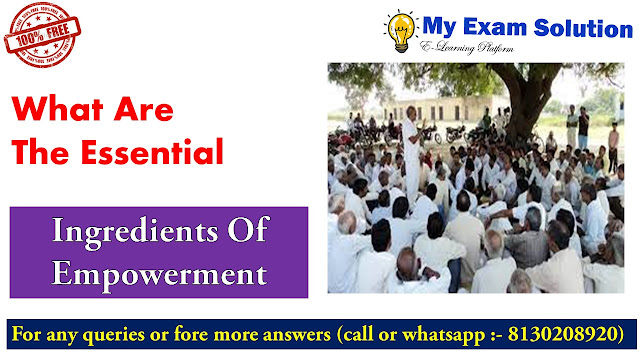What are the essential ingredients of empowerment? Explain the role of the panchayats as an agent of political empowerment
INTRODUCTION
Panchayats are the governing bodies in smaller villages from
where people can strive for bigger political exposure. They also get the
opportunity for political empowerment through Panchayat. Panchayats are
assigned with the task to implement centrally sponsored schemes in
villages and leading them to progress.
The concept of empowerment refers to process of bringing
about a transformation in all walks of the life of every individual citizen of
the country. The aim is to provide to them a sense of participation and to give
them the secure feeling that their voice will be heard irrespective of their
economic and social status. But to achieve such lofty ideals how would you go
about in a multi-cultural, multi-ethnic and multi-class society? Can we
identify areas that should be addressed? Can we really overcome the
inequalities caused by ‘nature’ and the man-made inequalities that have existed
for centuries? If so, how to go about achieving such objectives without
upsetting the social balance and/or creating social upheavals?
These are some of the questions that we will examine and will
try to find answers for. You must recognize that there are no easy solutions.
After all, the Indian society has, till recently, been an agrarian society
governed by the “Jajmani” system based on caste, heredity and occupation. So
far, social transformation, in our society governed by rights and duties, has
been slow.
You must be aware of the term “equality”. If so, you must
check it out with what we would list as areas wherein “equality” needs to be
achieved. In working for equality, the aim is not to achieve parity in size and
shape of human beings or leave them with equal portions of wealth. Instead we
will address those areas where equal treatment can be given to all, i.e. before
law, equal and inalienable rights, equal freedom or moral equality, full
political equality (as equal universal suffrage), social equality (as equal
status and consideration regardless of class or wealth) and equal opportunity
(as equal access and equal start). These are enshrined in different Articles in
the Indian Constitution which guarantees them
But if you are a perceptive student of democracy, you would
know that words enshrined in Constitution do not always translate into reality.
To achieve that goal of “equality”, it is necessary that you understand the
strong relationship between equality and democracy. Now, list the ingredients
that you would consider essential to help a person to achieve his individual
self. Having listed them, you may now compare the essential ingredients listed
by you with what we consider the four essential areas that need to be addressed
to achieve “equality”.
Social Empowerment
Social empowerment means removal of all the existing socially
induced inequalities, disparities and other persisting problems besides
providing easy access to basic minimum services. Social change is a dynamic
process and when a section of society, particularly the weaker sections like
the SCs/STs and women, is to be conferred the right to property, literacy and
equality in the political process, it results in radical transformation in
social practices in a society where money has retained a “ceremonial character
that is obligatory and effective”, as described by Mauss. In rural India, it
would also mean breaking up of “Jajmani” system. Empowering women would challenge
the ‘patriarchal’ structure of the society where conferment of property rights,
particularly land title, and literacy were considered to be the domain of male
members of the society.
EMPOWERMENT: CONCEPT AND DEFINITION
The Oxford Dictionary defines ‘empower’ as ‘authorize,
license (person to do), give power to, make able (person to do).’ It is only
when you understand the basic meaning of this term that you will be able to
appreciate the thoughts on “empowerment”.
This would mean that the term refers to the power that can be
bestowed by one person or the society or the Government on another person or a
group of persons (may be Class Group, Caste Group, Religious Group or Gender
based Group) as the case may be. The assumption is that a group (men, elite,
rich or the propertied class) has ‘power’ over another group (the landless,
labour class, ethnic minority or women) and the former are able to exercise
control in some way on the actions or options of the latter.
Such a control can be overt through coercion, physical
control of economic assets and use of force or it could be hidden and subtle
through psychological processes influencing the groups in such a way as to
restrict the range of options perceived by them or to enable them to perceive
the offered options as their own desire. Thus, this group of people is denied
power and influence in the dominant society. This, over a period of time,
internalizes the message that the dominant group gives out, as their own option
for their survival. When control becomes internalised, over a period of time,
overt exercise of power does not remain a necessity any longer.
ALSO READ:-
- What are the objectives of Pricing
- Write a short note on the concept of sat and asat found in the Veda
- Discuss Pararthanumana in Nyaya Philosophy
Whatsapp :- 8130208920
Youtube :- Myexamsolution







0 comments:
Note: Only a member of this blog may post a comment.